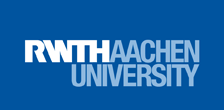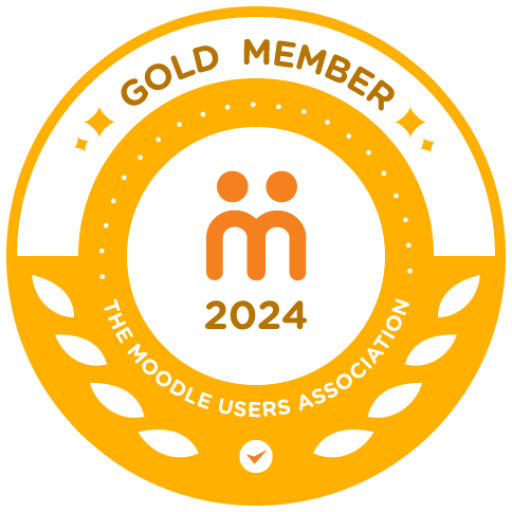Erklärung zur Barrierefreiheit
Die RWTH Aachen ist bemüht, ihre Websites und mobilen Anwendungen im Einklang mit den nationalen Rechtsvorschriften zur Umsetzung der Richtlinie (EU) 2016/2102 des Europäischen Parlaments und des Rates barrierefrei zugänglich zu machen.
Diese Erklärung zur Barrierefreiheit gilt für:
Produktbeschreibung: RWTHmoodle, Lernmanagementsystem der RWTH Aachen University, basierend auf dem Open-Source-Lernmanagementsystem Moodle
Version: 4.5
Stand der Vereinbarkeit mit den Anforderungen
Die oben genannte Website ist wegen der unten genannten Ausnahmen teilweise mit der WCAG 2.1 vereinbar.
Nicht barrierefreie Inhalte
Die nachstehend aufgeführten Inhalte sind nicht vollständig barrierefrei:
Besonderes Merkmal der Lernplattform ist die Erstellung von Kursen durch Dozent*innen und andere, sodass viele verschiedene Personen Lehrmaterialien zur Lernplattform RWTHmoodle beitragen.
Da nicht alle Beteiligten über die gleichen Kenntnisse im Bereich der barrierefreien Gestaltung verfügen, weisen die in RWTHmoodle abgelegten Informationen keine einheitliche Barrierefreiheit auf.
Die RWTH Aachen bietet den Lehrenden Prüfwerkzeuge, Anleitungen und Weiterbildungsmaßnahmen an, um sie bei der Erstellung barrierefreier Inhalte und Medien zu unterstützen. Durch diese Unterstützung verbessert sich die Qualität der bereitgestellten Inhalte kontinuierlich. Eine Übersicht der Angebote der verschiedenen Institutionen an der RWTH Aachen finden Sie auf der Seite Barrierefreie IT & Lehre.
Folgende Erfolgskriterien Stufe AAA nach WCAG 2.1 werden nur teilweise erfüllt:
- Kontraste: Die Textfarben in Moodle haben in der Regel ein Kontrastverhältnis von mehr als 7:1 zu ihrem Hintergrund. Es gibt einige Texte mit Farben, die das Mindestkontrastverhältnis von 4,5:1 für die WCAG 2.1 Stufe AA erfüllen, aber nicht die Anforderungen an den erhöhten Farbkontrast von 7:1 für die WCAG 2.1 Stufe AAA.
- Re-Authentifizierung: In den meisten Fällen wird der Fortschritt des Benutzers gespeichert, z. B. bei Aufgaben und Tests. Auf einigen Seiten wird dies jedoch nicht unterstützt, und die Daten müssen erneut eingegeben werden.
- Zeitüberschreitungen: Zeitüberschreitungen beziehen sich nur auf Sitzungszeitüberschreitungen, die für das System konfigurierbar sind. Die Benutzer*innen werden gewarnt, ihre Sitzung zu aktualisieren, bevor sie abgemeldet werden. In den meisten Fällen werden bereits eingegebene Entwürfe gespeichert und wiederhergestellt, wenn die Benutzer*innen ihre Tätigkeit wieder aufnehmen.
- Link-Zweck: Die meisten Links sind nur durch den Linktext eindeutig identifizierbar. Es gibt jedoch einige bekannte Bereiche, in denen der Zweck des Links nicht nur durch den Linktext bestimmt werden kann:
- Links zum Bearbeiten, Löschen, Antworten in einer Liste von Beiträgen innerhalb einer Forumsdiskussion.
- Die Buchstaben-Links zum Filtern einer Liste von Benutzer*innen nach Vor- oder Nachnamen ergeben aus dem Kontext genommen keinen Sinn.
- Links zum Bearbeiten, Löschen, Antworten in einer Liste von Beiträgen innerhalb einer Forumsdiskussion.
- Zielgröße: Die meisten Steuerelemente und anklickbaren Ziele sind größer als 44x44 CSS-Pixel. Es gibt jedoch Ausnahmen.
- Aussprache: Das Moodle-Kernsystem bietet in den meisten Fällen keine Ausspracheunterstützung. Moodle bietet jedoch die Möglichkeit, dass die von den Nutzer*innen erstellten Inhalte dieses Erfolgskriterium erfüllen, einschließlich Markierungen, automatischer Verlinkung von Glossaren und der Möglichkeit, dass ein Nutzer bzw. eine Nutzerin zusätzliche Inhalte hinzufügen kann.
- Fehlervermeidung: Mechanismen zur Validierung von Formularen ermöglichen es den Benutzer*innen, ihre Eingaben beim Ausfüllen eines Formulars zu korrigieren. Bestätigungsdialoge oder -seiten sind ebenfalls vorhanden, um zu verhindern, dass Benutzer*innen versehentlich eine irreversible Aktion durchführen (z. B. das Löschen von Daten usw.). Es gibt jedoch einige bekannte Fälle, in denen eine unumkehrbare Aktion keine vorherige Bestätigungsaufforderung erfordert, wie z. B. die Gewährung zusätzlicher Aufgabenversuche für Studierende.
Erstellung dieser Erklärung zur Barrierefreiheit
Diese Erklärung wurde am 03.02.2025 erstellt.
Diese Erklärung wurde am 03.02.2025 letztmalig überprüft.
Angewendete Bewertungsmethoden
Die Daten wurden dem offiziellen Bericht über die Konformität mit der Barrierefreiheit entnommen, der auf einer Prüfung der offiziellen Moodle-Seite Version 4.2 durch Grackle Docs (ehem. AbleDocs) basiert. Folgende Bewertungsmethoden werden im Bericht genannt:
AbleDocs hat im Januar 2024 eine Erklärung zur Konformität mit den WCAG 2.1 Level AA abgegeben. AbleDocs hat das Zugänglichkeitsaudit für Moodle 4.2 durchgeführt. [...] Die Bewertung wurde gemäß der WCAG-Evaluierungsmethodik (WCAG-EM) durchgeführt. Die Prüfung wurde manuell durchgeführt und durch das AbleDocs-Team von Zugänglichkeitsprüfern gegengeprüft, um sicherzustellen, dass die Ergebnisse und Kommentare gültig und umfassend sind.
Separate externe Tests des Moodle LMS wurden auch von einer Gruppe geschulter Tester*innen mit Zugänglichkeitsanforderungen durchgeführt, um die Abdeckung des Systems zu erhöhen.
Die folgenden Tools und Anwendungen wurden im Rahmen der Prüfung verwendet:
Desktop-Browser
Google Chrome
Firefox
Screenreader
JAWS
NVDA
Andere Tools
WAVE
NU HTML-Validator
Link zum vollständigen Konformitätsbericht von Moodle
In Deutschland wurde die BITV 2.0 (Barrierefreie-Informationstechnik-Verordnung) vom BMAS (Bundesministerium für Arbeit und Soziales) erlassen und legt die technischen Standards zur barrierefreien Gestaltung fest. Die meisten Prüfschritte entsprechen den Richtlinien der WCAG 2.1. Einige Prüfschritte messen darüber hinaus Anforderungen, welche die EN 301 549 zusätzlich erhebt. Eine vollständige Prüfung der oben genannten Website nach BITV-Kriterien steht noch aus.
Die Prüfung bezieht sich auf die Core-Elemente des LMS und deckt nicht zusätzlich installierte Plugins ab.
Feedback und Kontaktangaben
Eine Prüfung der aktuellen Moodle-Version der oben genannten Website steht noch aus, weshalb die hierin enthaltenen Informationen nach bestem Wissen und Gewissen auf der Grundlage von Moodle 4.2 zum Zeitpunkt der Zugänglichkeitsprüfung bereitgestellt werden und keinen rechtlich verbindlichen Anspruch darstellen. Bitte setzen Sie sich mit Dr. Harald Schnurbusch in Verbindung, um etwaige Fehler bei der Zugänglichkeit oder bei der Behauptung der Konformität zu melden, damit diese gegebenenfalls neu bewertet und korrigiert werden können:
Dr.-phil. Harald Schnurbusch
Leitung Abt. Lernplattformen – Evaluation – Assessment – Analytics (LEA)
CLS – Center für Lehr- und Lernservices
RWTH Aachen University
Kackertstr. 15
52072 Aachen
Telefon: +49 241 80-92680
E-Mail: schnurbusch@cls.rwth-aachen.de
Durchsetzungsverfahren
Sollten Sie auf Mitteilungen oder Anfragen zur barrierefreien Informationstechnik der Internetseite RWTHmoodle keine zufriedenstellenden Antworten erhalten haben, können Sie die Ombudsstelle für barrierefreie Informationstechnik einschalten. Unter Einbeziehung aller Beteiligten versucht die Ombudsstelle, die Umstände der fehlenden Barrierefreiheit zu ermitteln, damit der Träger diese beheben kann.
Sie ist der oder dem Beauftragten für die Belange der Menschen mit Behinderung nach § 11 des Behindertengleichstellungsgesetzes Nordrhein-Westfalen zugeordnet und über folgenden Kontakt zu erreichen:
E-Mail an die Ombudsstelle für barrierefreie Informationstechnik NRW senden
Weitere Informationen zur Ombudsstelle für barrierefreie Informationstechnik NRW finden Sie auf der
Seite der Ombudsstelle für barrierefreie Informationstechnik.

 RWTHmoodle-Hilfe
RWTHmoodle-Hilfe

 +49 241 / 80-24680
+49 241 / 80-24680
 +49 241 / 80-22981
+49 241 / 80-22981


